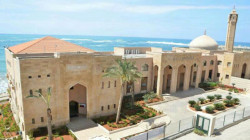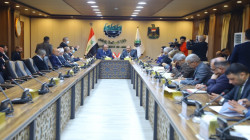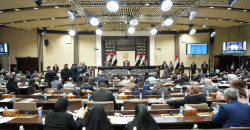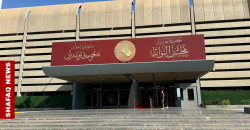Iraq's New Parliament Speaker: Dedicated to bridging political divides, committed to Palestine and Lebanon
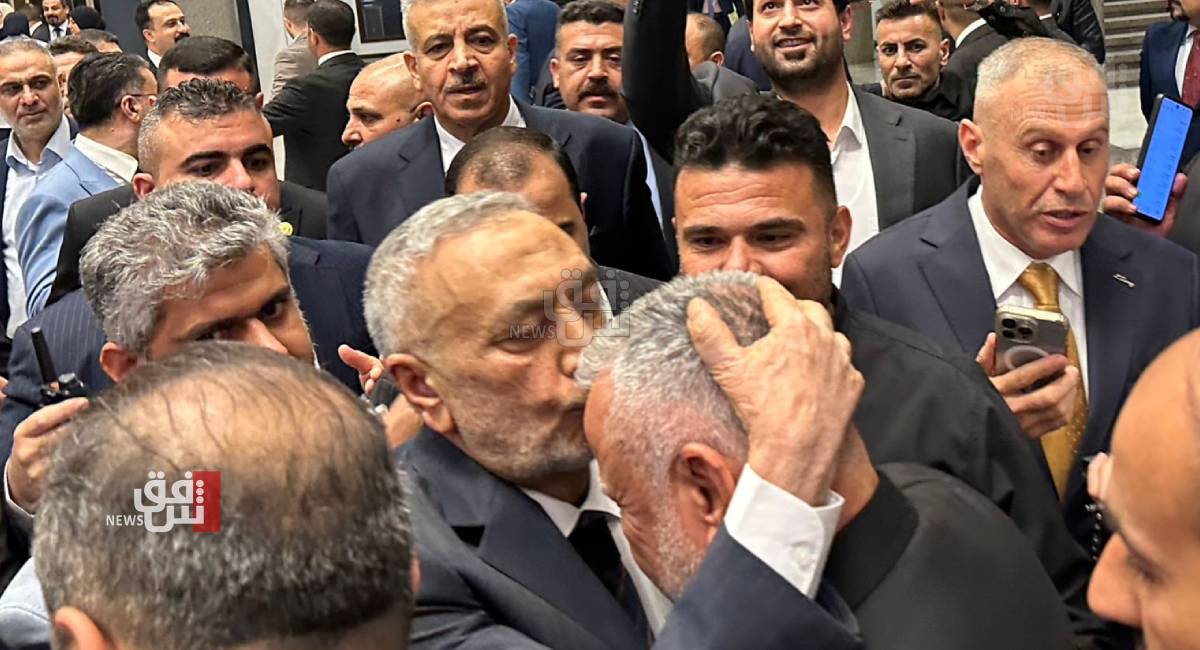
Shafaq News/ In a pivotal shift within Iraq's political landscape, Mahmoud al-Mashhadani has been elected as Speaker of Parliament, a move that followed months of intense negotiations and strategic alliances.
Backed by prominent Shiite and Kurdish factions, al-Mashhadani has pledged to bridge internal divides, strengthen legislative oversight, and advocate for regional stability.
Iraqi Parliament Moves to Elect New Speaker
Iraq’s Federal Supreme Court, the country’s highest judicial authority, officially terminated the parliamentary membership of Mohammed al-Halbousi, a prominent Sunni politician and former speaker of the Iraqi Parliament, in mid-November 2023. The ruling, based on a lawsuit alleging “fraud” filed by a fellow lawmaker, marked the end of al-Halbousi's tenure.
Following the decision, Iraq’s parliamentary leadership formally acknowledged al-Halbousi’s removal. Since then, several parliamentary sessions have convened to elect his successor. However, the vote has yet to take place, with political factions failing to reach a consensus on a replacement candidate.
Iraq’s power structure is traditionally divided among its main ethnic and religious groups: the presidency is held by a Kurd, the prime ministership by a Shia, and the parliamentary speaker’s position by a Sunni. Such appointments often demand protracted negotiations, sometimes extending for months.
This complex power-sharing structure has left political leaders in search of an agreement amid renewed debates over Iraq’s legislative priorities and coalition dynamics.
Shiite Parties Dominates Speaker Election
The Iraqi Parliament, comprising 329 members, is dominated by the Coordination Framework, which unites all Shiite factions except for the Sadrist Movement led by influential cleric Muqtada al-Sadr. With its alliances among Sunni and Kurdish blocs and independent members, the Coordination Framework has established itself as the primary force in parliamentary votes, including the upcoming election for a new speaker.
On the other hand, the Sunni blocs are largely split between al-Halbousi’s Taqaddum Alliance and the Sovereignty Alliance led by Khamis al-Khanjar. Although Taqaddum initially joined forces with Sovereignty following the last elections holding together 67 members and were considered the largest Sunni bloc in the new legislature, however, the factions now hold differing stances.
Additionally, the Kurdistan Democratic Party (KDP), headed by Masrour Barzani, wields considerable influence in the speaker election due to its substantial seat count (more than 30).
The remaining parliamentary factions are relatively minor players in shaping the leadership outcome.
This intricate web of alliances complicated the decision over the new parliamentary speaker, and at the same time led to a new era.
Iraq's Parliament Elects al-Mashhadani
On October 31, Iraq's Parliament elected Mahmoud al-Mashhadani as its new speaker, the man was viewed as a unifying figure among Sunni parties and emerged as a compromise candidate amid deep divisions within the Sunni political landscape.
Al-Mashhadani received backing from influential Shiite factions, including Nouri al-Maliki’s State of Law Coalition, along with Kurdish and Sunni leaders such as the ousted former speaker al-Halbousi. The Kurdistan Democratic Party (KDP) under Masoud Barzani’s leadership also threw its support behind al-Mashhadani, boosting his chances.
In the decisive vote, al-Mashhadani received 181 votes to win the position, while Salem al-Issawi, representing the Sovereignty bloc, garnered 43 votes.
The first round of voting had shown him leading with 153 votes but without the majority needed. Salem al-Issawi garnered 95 votes in the first round, while independent candidate Amer Abdul Jabbar received 9 votes, with 15 ballots declared invalid.
This coalition of Sunni, Shiite, and Kurdish powers behind al-Mashhadani could now mark a shift in forming new alliances.
Al-Mashhadani: Iraq’s Seasoned Lawmaker
Mahmoud al-Mashhadani, Iraq’s newly re-elected Speaker of Parliament, is a seasoned political figure known for his direct and often controversial approach.
At 75, al-Mashhadani brings a wealth of legislative and political experience to the role, having served previously as Speaker from 2006 to 2009.
He graduated from Baghdad University’s College of Medicine in 1972 and initially served as a doctor in the Iraqi army, holding the rank of first lieutenant.
Al-Mashhadani’s political journey has been key figure in Iraq’s post-2003.
As the first Iraqi Speaker after Saddam Hussein’s regime, he also presided over the Arab Inter-Parliamentary Union in 2008. His close relationship with key Shiite figures, including Hadi al-Amiri—whom he honored with a symbolic gesture following his victory—signifies the complex alliances that paved the way for his return to power.
During Saddam’s rule, he served 15 years in prison for opposing the Iran-Iraq war, and after 2003, he was briefly detained by US forces over alleged ties to an armed group. Yet these events did little to deter him; he went on to join Iraq’s constitutional committee in 2005 and became a significant Sunni voice in Iraqi politics.
Internationally, al-Mashhadani is noted for his balanced diplomatic stance, maintaining relations across regional powers—a reflection of his pragmatic approach to Iraq's foreign policy.
Analysts suggest that his reappointment signals a possible return to political ambitions for other influential leaders, including Nouri al-Maliki, as Iraq heads toward its next elections in 2025.
Al-Mashhadani Vows Legislative Reforms and Regional Solidarity
In his inaugural address as Iraq’s newly elected Speaker of Parliament, Mahmoud al-Mashhadani expressed gratitude to lawmakers for their trust, pledging to uphold democratic principles and foster cooperative efforts within the legislature. “This position is a considerable responsibility, and I commit to working with every member to enact laws that serve our people,” al-Mashhadani declared, emphasizing his intention to strengthen the legislative and oversight roles of Parliament.
He outlined plans for close collaboration with government institutions to address and resolve issues obstructing effective law implementation.
Turning to regional conflicts, al-Mashhadani voiced his unequivocal support for the Palestinian and Lebanese populations, who, he said, “stand resilient amid massacres that stain the conscience of humanity, inflicted by Zionist forces as the world remains silent in the face of the Israeli machinery of war.” He also pledged to “work in partnership with Arab and international parliaments to advocate for a ceasefire and press for an end to the violence through international channels.”
Concluding his address, al-Mashhadani stressed a commitment to action, promising, “Our efforts will go beyond speeches; we are determined to provide humanitarian aid to besieged and displaced families in Gaza and Lebanon.”
According to observers, al-Mashhadani’s leadership presents both opportunities and challenges for the country. With a commitment to fostering unity among diverse political factions and addressing pressing regional issues, al-Mashhadani's approach could pave the way for legislative reforms and enhanced cooperation. However, the effectiveness of these initiatives will depend on the ability of Iraq's political leaders to navigate the intricate web of alliances and historical divisions that have long plagued the nation's governance.

